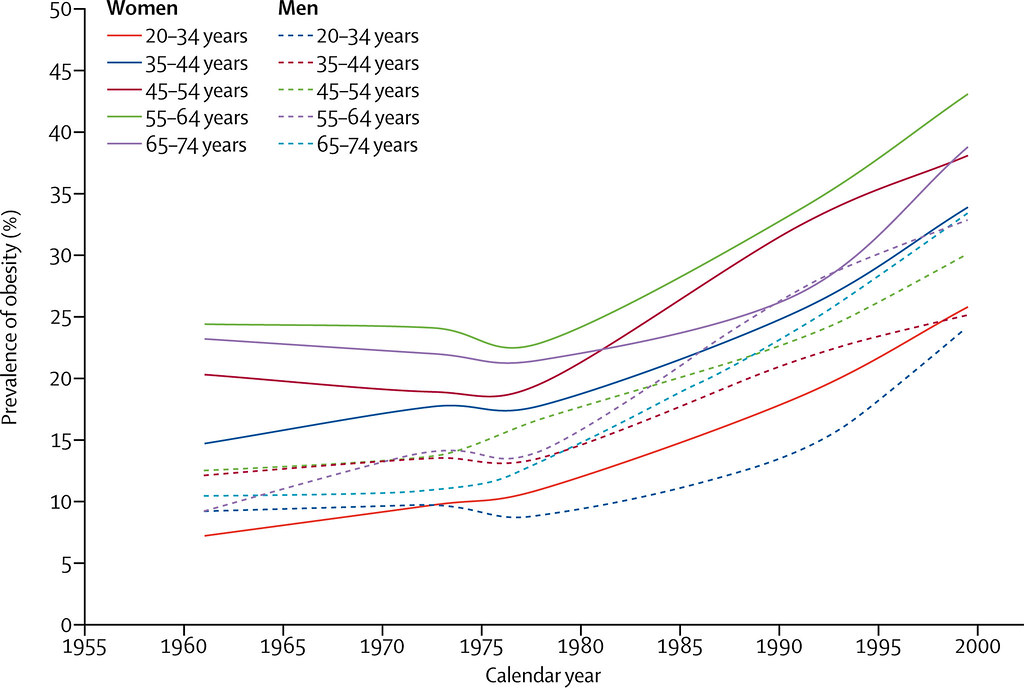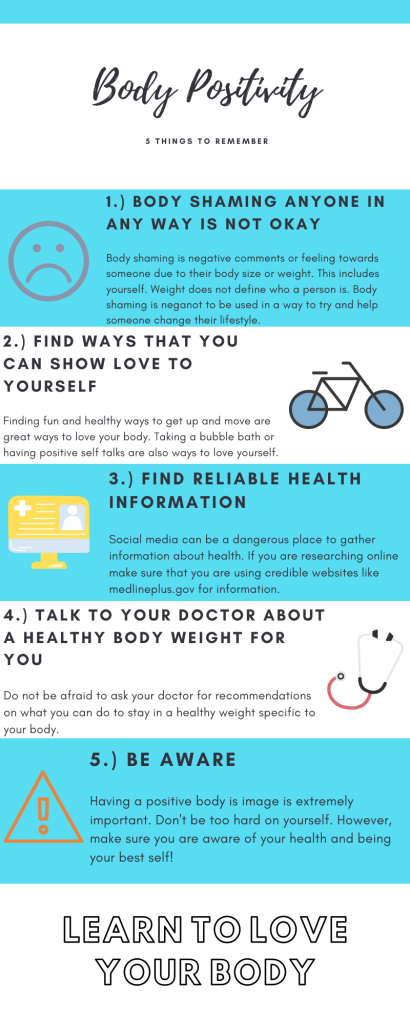15
Peyton Sutley
“Is Body Positivity Encouraging Obesity,” by The Doctors is in the Public Domain, CC.
Obesity has been steadily rising worldwide. To put obesity in an economic perspective, “obesity-related absences among U.S. employees cost the country as much as $6.38 billion annually in productivity, and scientists say severe weight gain is contributing to shrinking U.S. lifespans” (Williams, 2020). On the other hand, the body positivity movement has been trending now more than ever. The social media world has been a frontrunner in advocating for body positivity and “self-love”. Social media influencers, pop stars, and actors have taken over culture with millions of followers watching their every move. As these advocates are actively trying to cultivate a place for people to be true to themselves no matter their appearance, it is common for inaccurate information about health to be spread like wildfire. While body positivity is undeniably important for one’s mental health, a debate has emerged if it has blurred the line of major risks that are linked with having excess weight on one’s body. The main message here is not about fat versus thin, the focus needs to be on lowering the risk for heart disease, diabetes, and other chronic diseases.
A Search for Belonging
The body positivity movement was set into motion due “to the increased attention to the harms of weight bias and fat shaming” (Stanford et al., 2018). Weight bias is described as “negative attitudes towards someone with excess weight or obesity” (Stanford et al., 2018). Fat shaming is described as the physical act of humiliating someone due to their excess weight, or them being obese. Fat shaming and weight bias are a direct result of misinformation that culture has about a healthy body weight. Through research and discovery about the roles of genetics and other factors in obesity, the American Medical Association declared “obesity as a complex, chronic disease which requires medical attention” in 2013 (Stanford et al., 2018). Unfortunately, the media has yet to grasp the idea that obesity is a disease, a medical issue, not a problem with a lack of self-control.
The fat acceptance movement has been another way for people who are overweight or obese to cope and find a community that they feel welcome in. This movement was created by people who are from different backgrounds and education levels that question the health information and reports about obesity (Thomas et al., 2011). The goal of this movement was to seek a different way of defining “fat”. People who felt ashamed and targeted wanted to accept their body for what it is and live a life of confidence, despite concerns from healthcare professionals. The “Fatosphere” community was born from this. It is a digital community where people come together to feel accepted or fulfill their sense of belonging. A team of researchers who wrote “The role of the Fatosphere in fat adults’ responses to obesity stigma” studied how 44 different individuals, who take part in the Fatosphere blogging world, got there and what motivates them. Conclusions drawn from this study showed that this group was quite possibly far more focused on acceptance rather than the medical concerns that surround obesity.
It is important to note that social media is not to blame for the rise of obesity. Social media has just merely been an outlet for people to express their opinions. However, social media has helped tremendously in the normalizing of obesity and that is of major concern. Modeling social norms and social influence in obesity is a journal article from 2015 that was written to expand on the social influence of obesity. One model that they focused on was the social influence hypothesis. For obesity, the hypothesis is the “social contacts of individuals directly or indirectly influence obesity-related behaviors, and that social networks structure therefore shapes who becomes obese” (Shoham et al., 2015). The Social Influence Hypothesis model is just another way to look at how an individual develops behaviors that have become normalized by those in their communities or around them.
Normalizing Obesity
From a medical standpoint, the increase of desirable body size is due to the normalizing of obesity and the increase in body size increases the risk of multiple chronic diseases. In Figure 1, the increase of weight overtime in each age group supports that humans conform to the world around them: the trend of normalizing obesity. Sadly, studies have shown that the lack of communication between a doctor and a patient with obesity is way too common in culture today. A study done by Dr. Tiffany Powell at the University of Texas Southwestern, found that “that 8% of patients included in the study, or nearly 1 in 10 obese people, had misconceptions about their body weight” (O’Callaghan, 2009). Even more impor-

tantly Dr. Powell discusses that most of the doctors of these patients never advised them to make changes in their lifestyle to help their looming weight situation (O’Callaghan, 2009). The evidence here clearly shows that somewhere along the line the urgency and importance of the risks that obesity and excess body weight have was not given properly.
Ultimately, it is extremely important to remember that excess body fat does pose an increased risk for many chronic diseases. An article called “Can you be healthy at any size?” by Katherine Bowers (2010) states that, “If the two sides were to agree on anything, it would be this: Fitness is key, and pounds matter less than the type of body fat” (Bowers, 2010). Many people set aside healthy habits and determine for themselves if they are healthy in the moment and forget what could be coming in their future if they continue in this mindset. It must also be known that people who are extremely overweight can also have excellent blood work and blood pressure results giving the false sense that they are healthy. This is confirmed by Barbara Berkeley, M.D. who states, “overweight women with normal cholesterol and blood pressure levels can still go on to develop heart disease at higher rates” (Bowers, 2010).
Summary
While it is not necessarily ethical to question one’s body positivity or self-confidence, it should be taken into consideration if they are getting the proper information about where one’s body is at and what types of risk that is putting them at. This debate is not one that will be resolved any time soon. However, with proper education about obesity and its risks people can begin to work towards body positivity by improving their risks for certain diseases. Below are five important themes to remember when it comes to being positive about the body.

Review Questions
1. What is fat shaming?
a. Consulting someone about their weight
b. The physical act of humiliating someone due to their excess weight, or them being obese
c. Negative attitudes towards someone with excess weight or obesity
2. Approximately how much has obesity-related absences among employees costed the U.S. every year in productivity?
a. $6.38 billion
b. $5.98 million
c. $1.13 billion
d. $3.89 billion
3. What was the main goal of the fat acceptance movement?
a. Help people lose weight
b. To encourage a healthy view of self
c. A way for people who are obese or overweight to find a community that they feel welcome in
d. To seek a different way of defining “fat”
References
Bowers, K. (2019, June 14). Can you be healthy at any size? https://www.womenshealthmag.com/health/a19899286/fat-acceptance/
O’Callaghan, T. (2009). Obese and unaware: Can you be too comfortable with your body size? https://healthland.time.com/2009/11/18/obese-and-unaware-can-you-be-too-comfortable-with-your-body-size/
Shoham, D. A., Hammond, R., Rahmandad, H., Wang, Y., & Hovmand, P. (2015). Modeling social norms and social influence in obesity. Current epidemiology reports, 2(1), 71–79. https://doi.org/10.1007/s40471-014-0032-2
Stanford, F. C., Tauqeer, Z., & Kyle, T. K. (2018). Media and Its Influence on Obesity. Current Obesity Reports, 7(2), 186-192. https://doi.org/10.1007/s13679-018-0304-0
Thomas, S. L., King, B., Lewis, S., Holland, K., & Dickins, M. (2011). The role of the fatosphere in fat adults’ responses to obesity stigma. Qualitative Health Research, 21(12), 1679-1691. https:/doi.org/10.1177/1049732311417728
Williams J. P., (2020). The great body-acceptance debate. https://www.usnews.com/news/healthiest-communities/articles/2020-02-03/body-positivity-weight-bias-and-the-battle-for-a-healthy-life
the movement was to increase the attention of the public to the harms of weight bias and fat shaming
Stanford, F. C., Tauqeer, Z., & Kyle, T. K. (2018). Media and Its Influence on Obesity. Current Obesity Reports, 7(2), 186-192. doi:10.1007/s13679-018-0304-0
negative attitudes towards someone with excess weight or obesity
Stanford, F. C., Tauqeer, Z., & Kyle, T. K. (2018). Media and Its Influence on Obesity. Current Obesity Reports, 7(2), 186-192. doi:10.1007/s13679-018-0304-0
to make someone feel bad by making fun of them because of their weight
https://www.yourdictionary.com/fat-shame
a way for people who are overweight or obese to cope and find a community that they feel welcome in or also “regarded as a consumer-based movement comprised of individuals from varying philosophical backgrounds who question the dominant discourse of health reporting and information about obesity”
Thomas, S. L., King, B., Lewis, S., Holland, K., & Dickins, M. (2011). The role of the fatosphere in fat adults’ responses to obesity stigma. Qualitative Health Research, 21(12), 1679-1691. doi:10.1177/1049732311417728
